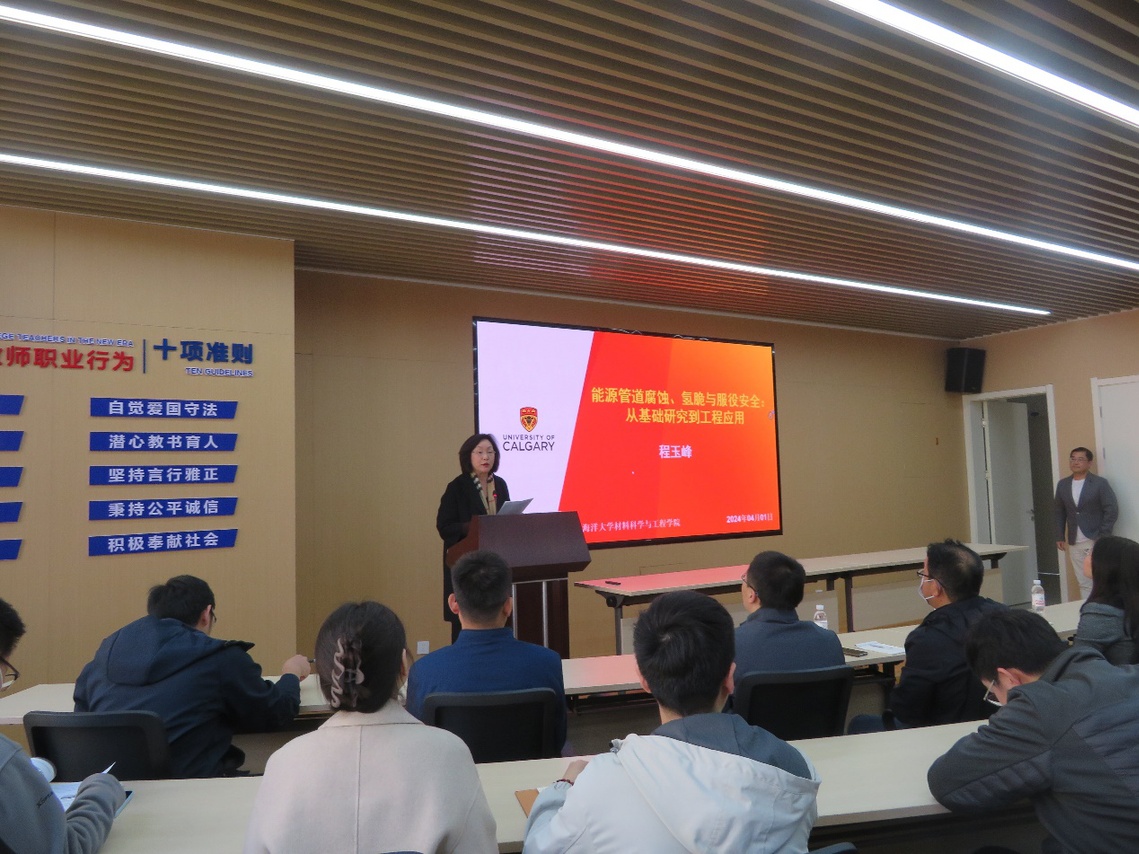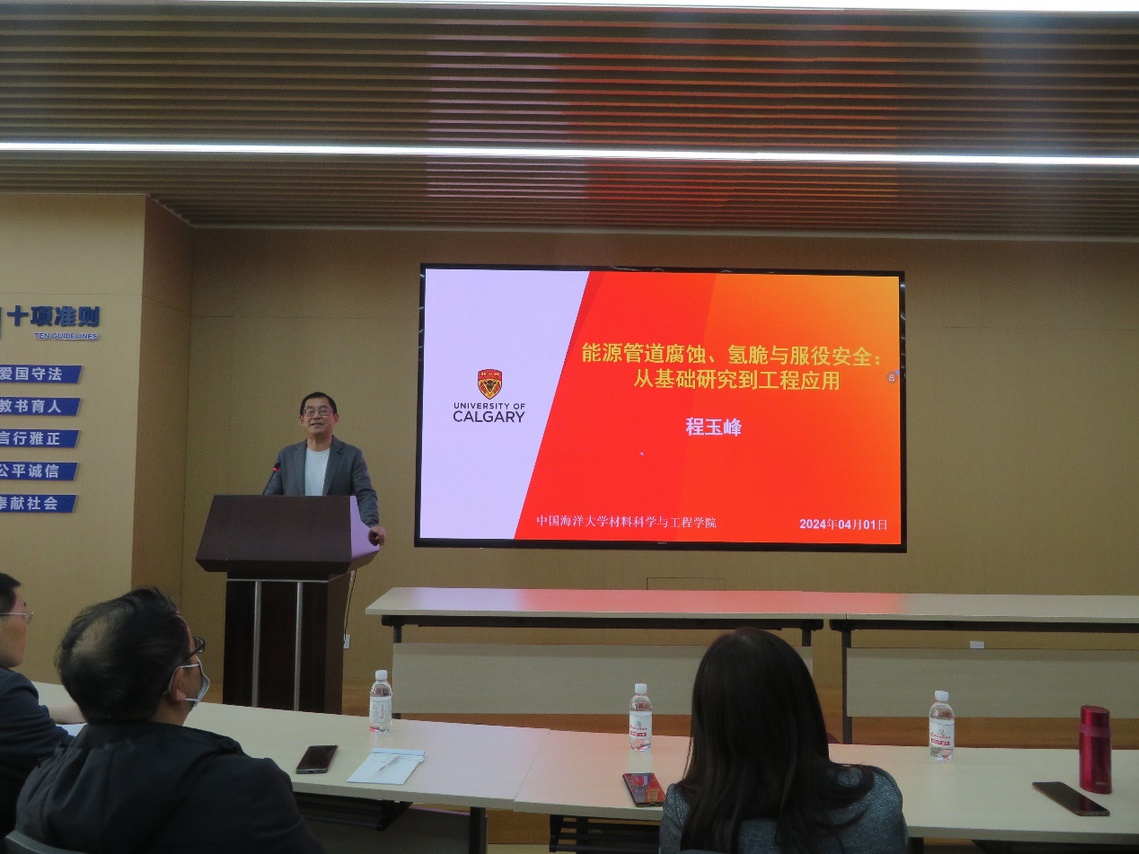On April 1, 2024, Cheng Yufeng, Academician of the Royal Canadian Academy of Sciences, Academician of the Canadian Academy of Engineering, tenured professor of the University of Calgary, director of the Center for Advanced Materials and Manufacturing, and National Chief Professor of the Canadian Energy Pipeline field, was invited to the school to give a lecture on "Energy Pipeline Corrosion, hydrogen embrittleness and Service Safety: From Basic Research to Engineering Application "academic report, chaired by Dean Cui Hongzhi.

President Cui presided over the presentation
Energy pipeline corrosion, hydrogen embrittlement and other problems seriously affect the safety of pipeline service. Academician Cheng introduced the research results obtained in detail from the aspects of hydrogen pipeline technology, CO2 pipeline, pipeline corrosion and service safety assessment. The concept of "metallurgical microelectrochemistry" was first proposed in the world, and a variety of micro-nano electrochemical techniques were applied to study pipeline corrosion phenomena, which greatly enriched the knowledge system of pipeline steel corrosion and stress corrosion cracking. The local electrochemical activity of nanoscale metallurgical and mechanical defects in pipeline steel in service environment was studied and determined. Mechanical-chemical interaction was applied to the study of pipeline corrosion, and "mechanical-electrochemical effect theory of pipeline corrosion" was first proposed. A "multi-physics coupling effect model" is proposed for pipeline safety assessment and failure prediction technology, and the research results are applied to the integrity management system of several international pipeline companies. Academician Cheng pointed out that currently hydrogen energy, as a clean fuel, plays an important role in the context of today's international energy transition. At present, the use of long-distance pipeline for large-scale long-distance efficient hydrogen transport has been listed as a priority technology in the development strategy of hydrogen energy by many countries. In view of the hydrogen embrittlement of carbon steel pipelines in high-pressure gas phase hydrogen environment, the uniqueness of hydrogen embrittlement in high-pressure gas phase environment is systematically analyzed, and the key techniques for studying hydrogen iron interaction and gas phase hydrogen embrittlement are put forward.

Academician Cheng gave a report
In the discussion session, the participating teachers and students actively asked questions and conducted in-depth exchanges on the corrosion of energy pipelines and hydrogen embrittlement. More than 100 students and teachers from the School of Materials Science and Engineering attended the lecture. The lecture was held at the Baichuan Forum of Ocean University of China, hosted by the Graduate School and hosted by the School of Materials Science and Engineering.
Text: Li Wen
Photo: Han Zhenbang Nie Yang
Fellow, Royal Canadian Academy of Sciences, Canadian Academy of Engineering. He received his bachelor's degree from Hunan University in 1990 and his master's degree from the Institute of Metal Corrosion and Protection, Chinese Academy of Sciences in 1993. He studied abroad in the University of Alberta, Canada in 1996 and obtained his Doctor's degree in materials engineering in 1999. He is currently a tenured professor at the University of Calgary, director of the Centre for Advanced Materials and Manufacturing, National Chief Professor in the field of energy pipelines in Canada, and named Canada's Outstanding Materials Scientist in 2019. He is mainly engaged in the research of electrochemical corrosion, stress corrosion cracking, hydrogen embrittlement and structural safety of hydrogen, carbon dioxide and natural gas pipelines. He has published 4 personal research monographs, more than 300 journal papers, nearly 20,000 citations, H-factor 80, and ranks among the top six most influential scientists in the world of materials science.
He has made pioneering achievements in the study of the interaction between hydrogen and iron atoms in high-pressure gas phase and the hydrogen embrittance in pipeline gas phase, and established the thermodynamic theory of hydrogen generation, adsorption and absorption in gas phase environment. Development of in-service natural gas pipeline hydrogen transportation adaptability evaluation technology; The concept of microelectrochemical theory of metallurgy was put forward, and the thermodynamics and kinetics of stress corrosion reaction under mechanical-electrochemical interaction were established. Develop a new generation of multi-physics coupling effect evaluation technology to improve the diagnostic accuracy of energy pipeline service conditions.
He has received the H.H. Uhlig Award and Technical Achievement Award from the American Society for Corrosion Engineering (NACE), the Brian Ives Award from the American Society for Materials Protection and Service (ASM), the Oladis Troconis de Rincon Award from the American Society for Materials Protection and Service (AMPP), and the Canadian Association of Mining, Metallurgy and Petroleum Distinguished Lecture Award (CIM), Metal Chemistry Award of the Metallurgical and Materials Association of Canada (MetSoc), Gold Medal of the International Association of Advanced Materials (IAAM) and Advanced Materials Laureate. He is currently a member of the American Institute of Corrosion Engineering (NACE), the British Institute of Corrosion Engineering (ICorr), the Chinese Society of Corrosion and Protection, the British Association of Materials Mining and Minerals (IMMM), and the International Association of Advanced Materials (IAAM). He is editor-in-chief of the Journal of Pipeline Science and Engineering (KeAi/Elsevier).


